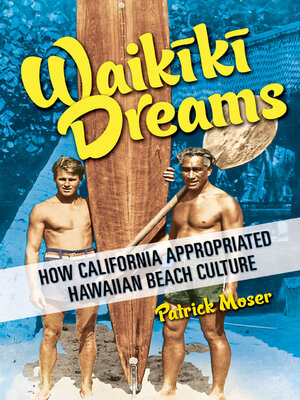Waikiki Dreams
ebook ∣ How California Appropriated Hawaiian Beach Culture · Sport and Society
By Patrick Moser

Sign up to save your library
With an OverDrive account, you can save your favorite libraries for at-a-glance information about availability. Find out more about OverDrive accounts.
Find this title in Libby, the library reading app by OverDrive.



Search for a digital library with this title
Title found at these libraries:
| Library Name | Distance |
|---|---|
| Loading... |
Despite a genuine admiration for Native Hawaiian culture, white Californians of the 1930s ignored authentic relationships with Native Hawaiians. Surfing became a central part of what emerged instead: a beach culture of dressing, dancing, and acting like an Indigenous people whites idealized.
Patrick Moser uses surfing to open a door on the cultural appropriation practiced by Depression-era Californians against a backdrop of settler colonialism and white nationalism. Recreating the imagined leisure and romance of life in Waikīkī attracted people buffeted by economic crisis and dislocation. California-manufactured objects like surfboards became a physical manifestation of a dream that, for all its charms, emerged from a white impulse to both remove and replace Indigenous peoples. Moser traces the rise of beach culture through the lives of trendsetters Tom Blake, John "Doc" Ball, Preston "Pete" Peterson, Mary Ann Hawkins, and Lorrin "Whitey" Harrison while also delving into California's control over images of Native Hawaiians via movies, tourism, and the surfboard industry.
Compelling and innovative, Waikīkī Dreams opens up the origins of a defining California subculture.
|Acknowledgements
A Note on Hawaiian Language
Introduction
Prologue: California Beach Culture in the 1920s—The Decade of Duke
Part I. The Builders
Notes
Bibliography
Index
|"Moser challenges conventional surf historiography in ways that are desperately needed. Mainstream surf narratives frequently point out the influence of Native Hawaiian culture on California surf culture, but typically without critical analysis. Moser upends these narratives by bringing in Indigenous scholarly perspectives to explain the dynamics of cultural appropriation in a refreshingly updated approach."—Dina Gilio-Whitaker, author of As Long as Grass Grows: The Indigenous Fight for Environmental Justice from Colonization to Standing Rock|Patrick Moser is professor of writing and French at Drury University. He is the author of Surf and Rescue: George Freeth and the Birth of California Beach Culture and the editor of Pacific Passages: An Anthology of Surf Writing.







